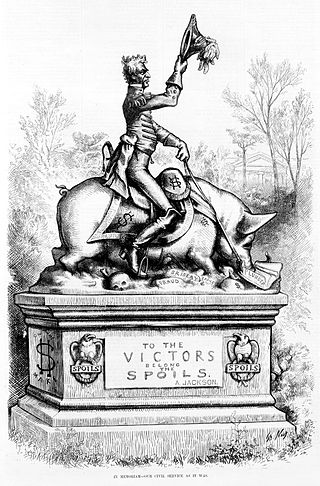Related Research Articles

In politics and government, a spoils system is a practice in which a political party, after winning an election, gives government jobs to its supporters, friends (cronyism), and relatives (nepotism) as a reward for working toward victory, and as an incentive to keep working for the party—as opposed to a merit system, where offices are awarded on the basis of some measure of merit, independent of political activity.
The civil service is a collective term for a sector of government composed mainly of career civil servants hired rather than appointed or elected, whose institutional tenure typically survives transitions of political leadership. A civil servant, also known as a public servant, is a person employed in the public sector by a government department or agency for public sector undertakings. Civil servants work for central and state governments, and answer to the government, not a political party.

The mayor of New York City, officially Mayor of the City of New York, is head of the executive branch of the government of New York City and the chief executive of New York City. The mayor's office administers all city services, public property, police and fire protection, most public agencies, and enforces all city and state laws within New York City.
A civil township is a widely used unit of local government in the United States that is subordinate to a county, most often in the northern and midwestern parts of the country. The term town is used in New England, New York, and Wisconsin to refer to the equivalent of the civil township in these states; Minnesota uses "town" officially but often uses it and "township" interchangeably. Specific responsibilities and the degree of autonomy vary in each state. Civil townships are distinct from survey townships, but in states that have both, the boundaries often coincide and may completely geographically subdivide a county. The U.S. Census Bureau classifies civil townships as minor civil divisions. Currently, there are 20 states with civil townships.

The United States Civil Service Commission was a government agency of the federal government of the United States and was created to select employees of federal government on merit rather than relationships. In 1979, it was dissolved as part of the Civil Service Reform Act of 1978; the Office of Personnel Management and the Merit Systems Protection Board are the successor agencies.
Police commissioner is a senior rank in many police forces of the world. In other jurisdictions, it is the title of a member of an oversight board.
A law enforcement officer (LEO), or peace officer in North American English, is a public-sector employee whose duties primarily involve the enforcement of laws. The phrase can include campaign disclosure specialists, local police officers, prosecutors, municipal law enforcement officers, health inspectors, SWAT officers, customs officers, lawyers, state troopers, federal agents, secret agents, special investigators, coast guards, border patrol officers, judges, district attorney, bounty hunters, gendarmerie officers, immigration officers, private investigators, court officers, probation officers, parole officers, arson investigators, auxiliary officers, animal control officers, game wardens, park rangers, county sheriff's deputies, constables, marshals, detention officers, correction officers, sworn campus police officers and public safety officers. Security guards are not law enforcement officers, unless they have been granted powers to enforce particular laws, such as those accredited under a community safety accreditation scheme such as a security police officer.

Thomas Howard Ruger was an American soldier and lawyer who served as a Union general in the American Civil War. After the war, he was a superintendent of the United States Military Academy at West Point, New York.

The United States Sanitary Commission (USSC) was a private relief agency created by federal legislation on June 18, 1861, to support sick and wounded soldiers of the United States Army during the American Civil War. It operated across the North, raised an estimated $25 million in Civil War era revenue and in-kind contributions to support the cause, and enlisted thousands of volunteers. The president was Henry Whitney Bellows, and Frederick Law Olmsted acted as executive secretary. It was modeled on the British Sanitary Commission, set up during the Crimean War (1853-1856), and from the British parliamentary report published after the Indian Rebellion of 1857.
The United States federal civil service is the civilian workforce of the United States federal government's departments and agencies. The federal civil service was established in 1871. U.S. state and local government entities often have comparable civil service systems that are modeled on the national system, in varying degrees.

The New York State Department of Environmental Conservation is a department of New York state government. The department guides and regulates the conservation, improvement, and protection of New York's natural resources; manages Forest Preserve lands in the Adirondack and Catskill parks, state forest lands, and wildlife management areas; regulates sport fishing, hunting and trapping; and enforces the state's environmental laws and regulations. Its regulations are compiled in Title 6 of the New York Codes, Rules and Regulations. It was founded in 1970, replacing the Conservation Department. and is headed by Basil Seggos.

The Government of the State of New York, headquartered at the New York State Capitol in Albany, encompasses the administrative structure of the U.S. state of New York, as established by the state's constitution. Analogously to the US federal government, it is composed of three branches: executive, legislative, and judicial. The head of the executive is the governor. The Legislature consists of the Senate and the Assembly. The Unified Court System consists of the Court of Appeals and lower courts. The state is also divided into counties, cities, towns, and villages, which are all municipal corporations with their own government.

The Judiciary of New York is the judicial branch of the Government of New York, comprising all the courts of the State of New York.
Cesar Augusto Perales is an American attorney, civil servant and was the previous Secretary of State of New York in the Cabinet of Governor Andrew Cuomo. Perales was appointed by Cuomo on March 31, 2011, and unanimously confirmed by the New York State Senate on June 7.

The New York City Department of Finance (DOF) is the revenue service, taxation agency and recorder of deeds of the government of New York City. Its Parking Violations Bureau is an administrative court that adjudicates parking violations, while its Sheriff's Office is the city's primary civil law enforcement agency.

William Russell Willcox was an American politician from New York. On January 1, 1905, he became the Postmaster of New York City. By 1909 he was chairman of the New York Public Service Commission. He served on the Railway Wage Commission in 1918.

The New York State Civil Service Commission is a New York state government body that adopts rules that govern the state civil service; oversees the operations of municipal civil service commissions and city and county personnel officers; hears appeals on examination qualifications, examination ratings, position classifications, pay grade determinations, disciplinary actions, and the use of preferred lists; and requests to continue the employment of individuals who are retired. Its regulations are compiled in title 4 of the New York Codes, Rules and Regulations.

Secretary to the Government of India, often abbreviated as Secretary, GoI, or simply as Secretary, is a post and a rank under the Central Staffing Scheme of the Government of India. The authority for the creation of this post solely rests with the Union Council of Ministers.

The Business Integrity Commission (BIC) is the agency of the New York City government responsible for regulating the private carting industry, public wholesale markets businesses, and the shipboard gambling industry. Its purpose is to combat corruption in these industries from organized crime, and was created from the 2001 Organized Crime Control Commission, itself created from the 1996 Trade Waste Commission, the Markets Division in the Small Business Services Department, and the Gambling Commission.